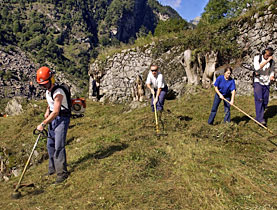
Volunteers play key role in Swiss society

One in two people in Switzerland does community work, according to a survey published on United Nations International Volunteer Day.
The main motivation is to help others and for personal reasons, and not because the volunteers are keen to receive official recognition in the shape of a diploma or certificate.
In one of the largest surveys in recent years, about 52 per cent of the respondents said they were involved in some form of community work, the Swiss Benevolent Society said on Wednesday.
It also found that four out of five people in the country had in the past done some kind of unpaid work.
The society’s new president, Annemarie Huber-Hotz, said she hoped the results of the so-called Volunteer Monitor, carried out by research and marketing group Demoscope, would give a boost to voluntary labour.
“Voluntary work will be a key issue of society in the future,” she said at a news conference in Bern.
The survey showed that men in particular do their voluntary work as members of clubs and organisations, while women were committed to more informal activities in their families or neighbourhood.
Sports and leisure
One in four people said their community work was as a member of a club or organisation, mostly involving sport or leisure activities.
Unpaid work for political parties, environmental or human rights groups was less popular, the report noted, adding that women tended to be more involved in activities that had little prestige.
There were also considerable differences between the majority German-speaking and the minority French- and Italian-language regions.
“Switzerland with its cultural and social diversity would be a different place without the huge efforts by volunteers,” said Christa Markwalder of the Forum for Volunteers.
A total of 7,410 people above the age of 15 were interviewed in the nationwide survey, which was carried out by Demoscope in autumn 2006.
Many prepared
The head of the Benevolent Society, Herbert Ammann, said there was clearly a large number of people in Switzerland prepared to do voluntary work but many did not want to be tied down by it.
“As soon as they become members of an organisation, many people feel they are bound by duty. As a result, donating is also a popular and important form of commitment,” he said in an interview with his society’s news publication.
Ammann said it was important for volunteers to be prepared to take responsibility for their work.
“But they also want recognition for their commitment. Clubs and organisations would do well to take this into consideration.”
Previous studies have found that two thirds of the Swiss population have carried out some form of voluntary work in their lives.
Last year, the Federal Statistics Office estimated that one in four Swiss worked as volunteers.
swissinfo with agencies
The International Volunteer Day for Economic and Social Development was adopted by the United Nations General Assembly in 1985.
Since then, governments, the UN system and civil society organisations have joined volunteers around the world to celebrate the day on December 5.
The Swiss-based International Federation of Red Cross and Red Crescent Societies says its 100 million volunteers and members around the world are essential for successful humanitarian assistance.
“Volunteerism is a feature of all cultures and societies.”
“It is a fundamental source of community strength, resilience, solidarity and social cohesion.”
“Such contributions are vital to the three pillars of the United Nations’ work – promoting peace and security, advancing development, and protecting human rights and human dignity.”

In compliance with the JTI standards
More: SWI swissinfo.ch certified by the Journalism Trust Initiative

























You can find an overview of ongoing debates with our journalists here . Please join us!
If you want to start a conversation about a topic raised in this article or want to report factual errors, email us at english@swissinfo.ch.